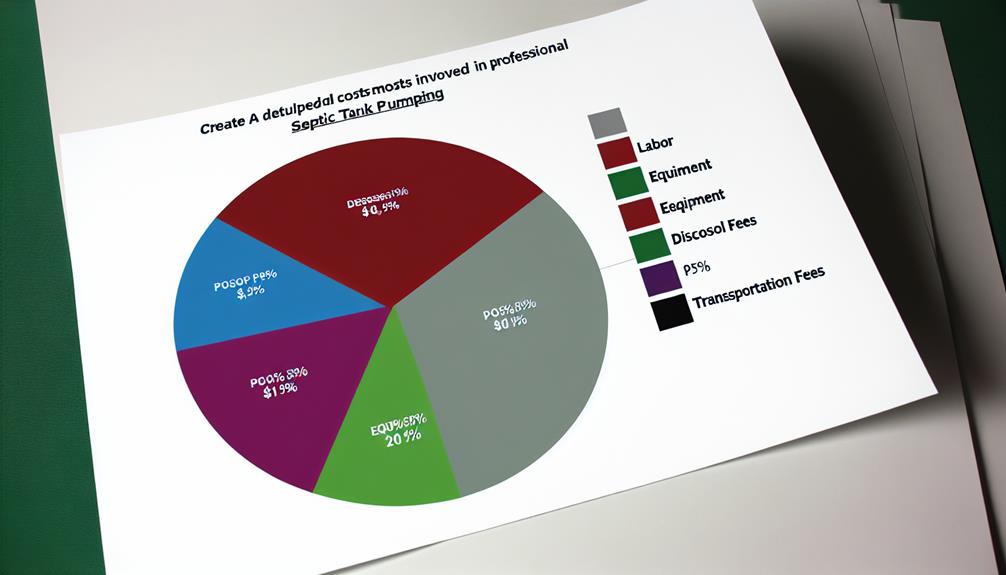Discover how to protect your septic system from breakdown with...
Read MoreYou & Your Septic Tank
Understanding the Costs of Professional Septic Tank Pumping
Our professional septic service team offers comprehensive septic tank pumping services to keep your system running smoothly. Get a FREE Quote Today.

Understanding the Costs of Professional Septic Tank Pumping
Let’s face it, dealing with your home’s ‘underground waste management system’ isn’t exactly a pleasant walk in the park. However, it’s a necessary chore that, if ignored, can lead to some seriously stinky situations.
As you consider the task of professional septic tank pumping, you’re probably wondering about the costs associated with this service. How much should you expect to spend? What factors can affect the pricing?
We’re about to pull back the curtain on these questions, giving you a clearer picture of what to expect. By the end of this discussion, you’ll have a better understanding of the financial implications, and why it’s a worthy investment for your home.
Key Takeaways
- Factors such as the number of people in the household, volume of wastewater, and amount of solids influence septic tank pumping costs.
- Regional pricing variations exist, with urban areas typically having different pricing than rural areas, and the distance from the service provider and geographical factors also affecting costs.
- When choosing a service provider, it is important to obtain quotes from multiple professionals and consider their reputation and reliability.
- Additional expenses and services to consider include inspections, repairs, hidden charges, emergency services, and unexpected complications. To minimize pumping costs, regular maintenance, DIY inspections, limiting water usage, and being mindful of what is flushed down toilets are recommended.
Evaluating Septic Tank Pumping Costs

When it’s time to evaluate your septic tank pumping costs, understanding the factors that influence these expenses can assist you in making an informed decision. One key factor is the pumping frequency determination. The frequency at which your tank needs pumping depends on the number of people in your household, the volume of wastewater generated, and the amount of solids in the wastewater. The more often you need pumping, the more it’ll cost you in the long run.
Regional pricing variations also play a significant role in the cost of septic tank pumping. Depending on where you live, the cost can vary significantly. Generally, urban areas tend to have higher costs due to increased operational expenses like labor and transportation. Conversely, in rural areas, the costs might be lower, but accessibility issues can add to the expenses.
It’s crucial to get quotes from several professionals in your area and compare them. Remember, the lowest price mightn’t always be the best choice. Consider the reputation and reliability of the service provider too. Being aware of these factors can help you plan your budget effectively and avoid any unpleasant surprises.
Factors Influencing Pricing
Diving into the factors that influence the pricing, it’s crucial to understand that the size of your septic tank, the amount of waste, and the distance from the service provider significantly impact the overall cost.
- Size of Your Septic Tank: Larger tanks require more labor and time to pump, hence, they’re typically more expensive to service. The average residential tank size ranges from 1,000 to 1,500 gallons, which directly influences the pumping cost.
- Amount of Waste: If your tank is full or overflows, the service provider might charge extra due to the additional work required. Regular maintenance can prevent excessive waste buildup, reducing your pumping costs.
- Distance From Service Provider: If you live far from your chosen service provider, you’re likely to pay more due to the added transportation costs. So, it’s worth considering local service providers.
Furthermore, don’t overlook the influence of Regional Pricing Variations and Pumping Frequency Impact. Different areas have different pricing standards due to local regulations, competition, and cost of living. The frequency of pumping also affects the price; less frequent services may lead to a buildup of solid waste which is harder and more costly to pump. Understanding these factors can help you manage your expenses more effectively.
Cost Breakdown of Pumping Services

So, how exactly are the costs for septic tank pumping services broken down? Well, it’s not a one-size-fits-all approach. The total cost is influenced by several key factors.
Firstly, pumping frequency directly affects the cost. If you’re getting your tank pumped regularly, such as every three to five years, you’ll generally be looking at lower costs per service. That’s because regular pumping helps to prevent costly complications like backups or system failures.
Secondly, geographical variations play a significant role. If you’re in a remote area, you might pay more due to increased transportation and labor costs. On the other hand, urban dwellers might find the costs slightly lower due to the availability of numerous service providers.
Other factors include the size of your tank (bigger tanks cost more to pump), the difficulty of access to your septic tank, and whether any additional services are required, such as inspections or repairs.
Understanding this cost breakdown can help you budget for this necessary service. Remember, regular maintenance of your septic tank isn’t just about saving money; it’s also about ensuring the longevity of your system and protecting your property.
Potential Additional Expenses
While understanding the basic cost breakdown of septic tank pumping services is essential, it’s equally important to be aware of potential additional expenses that might arise. These can significantly inflate the final bill and disrupt your budgeting.
- Hidden Charges: Be cautious of hidden charges. These could be for tasks like digging to access the tank, disposal of the waste, or even after-hours service. Always ask for a detailed quote upfront to avoid any surprises.
- Emergency Services: If your septic tank fails unexpectedly and requires immediate attention, you may be charged extra for emergency services. These services often carry a premium due to the time-sensitivity and urgency of the work.
- Repairs or Replacements: While pumping the septic tank, the professionals might discover parts that need repair or replacement. This could include damaged baffles, cracked lids, or failed pumps. These are costs that would be over and above the standard pumping charges.
Tips to Minimize Pumping Costs

To keep your septic tank pumping costs to a minimum, it’s crucial to implement regular maintenance and preventive measures. Preventive maintenance helps in identifying potential problems early before they escalate into significant issues that require expensive repairs.
Here are some tips to help you save on your septic tank pumping costs.
First, consider DIY options for simple tasks such as regular inspections. You can check for signs of septic failure like foul odors, slow drainage, and unusually lush vegetation around the septic area.
Next, limit the amount of water going into the septic system. Try to only run full loads of laundry and avoid letting water run unnecessarily. This decreases the frequency of pumping, thus saving you money.
Also, be mindful of what you flush down your toilets. Non-degradable items can block your system, leading to costly repairs. It’s best to stick to toilet paper.
Frequently Asked Questions
How Often Should a Septic Tank Be Pumped?
You should have your septic tank pumped every 3-5 years. However, pumping frequency can vary based on factors like tank size, household size, and usage. It’s crucial to factor these costs into your budgeting.
What Are the Signs That My Septic Tank Needs Pumping?
If you’re noticing foul odors, slow drains, or lush, green grass over the drain field, your septic tank likely needs pumping. These signs indicate it’s time for some septic tank maintenance. Don’t ignore them.
Can I Pump My Own Septic Tank or Do I Need to Hire a Professional?
You could pump your own septic tank, but it’s not recommended due to DIY risks. Without professional training and the right pumping equipment, you might cause damage or neglect important maintenance steps.
What Damage Could Occur if I Don’t Pump My Septic Tank Regularly?
If you don’t regularly pump your septic tank, it could overflow, causing environmental damage and health risks. You’re risking soil and water contamination, bad odors, and potential illness in your household. It’s not worth it.
How Long Does the Septic Tank Pumping Process Typically Take?
You might worry about time, but typically, with professional pumping equipment, septic tank pumping takes 1 to 2 hours, depending on the tank capacity. It’s a quick process to prevent long-term damage to your system.
Conclusion
Understanding septic tank pumping costs can be daunting, yet it’s essential for proper maintenance. The price varies depending on several factors like size, location, and condition. Additional expenses may arise, elevating the cost. However, you can minimize these by regular maintenance and timely pumping.
Remember, investing in professional septic tank services isn’t just about avoiding mess, it’s also about preserving your home’s value and health.
You may also like...
Why Are DIY Fixes Essential for Septic Tank Pumping?
Tap into the importance of DIY fixes for septic tank...
Read MoreUnveiling the Average Costs of Septic Tank Pumping
Master the mysteries of septic tank pumping costs and avoid...
Read More
The Best Septic Tank Pumping Services Near You

Answer Some Questions
Let us know about your needs so we can find you the right septic tank pros.

Get Quotes
We will put you in touch with the right septic tank pros for your job and location.

Hire Right
Compare quotes, message or call pros, and hire only when ready.



